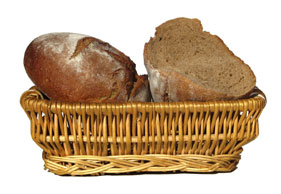We always hear that breakfast is the most important meal of the day. Simply put, breakfast is “breaking the fast,” because after sleeping and being without food during the night, our brain and muscles need energy to function. Skipping breakfast is therefore like starting on a long road trip with your fuel gauge almost on empty – you're bound to run out of gas halfway through your busy morning. In fact, there are a number of healthy benefits from eating breakfast.
Increased Metabolism: Eating a healthy breakfast helps kick-start your metabolism. If we do not eat for long periods of time, our bodies store energy as fat rather than burning it. People who skip breakfast and do not eat until lunch time risk fat storage as the body is not sure when it will next receive fuel in the form of food. For the entire morning, instead of working at peak rates and burning off more calories, your body will be trying to conserve everything it can, which in turn decreases your metabolism.
Higher Energy Levels: The longer you go without eating, the more your body starts to slow and shut down. Studies have shown that adults who eat breakfast in the morning are less tired and irritable during the day and have longer attention spans. Eating breakfast will allow you to be more active during the day, increase your energy levels and help you burn calories. You're more likely to go for a run if you don't feel exhausted all day.
Better Memory: More than one study done on adults found those who had nothing for breakfast underperformed on short-term memory tests compared to those who'd had their first meal. Eating breakfast provides fuel for the brain, which can help to improve memory and brain function.
Weight Control: Many studies have shown that breakfast eaters tend to weigh less than breakfast skippers. One theory suggests that eating a healthy breakfast can reduce hunger throughout the day and helps people make better food choices at other meals. Hunger gets the best of breakfast-skippers, and they eat more throughout the day. A high-fibre and protein breakfast can keep you fuller for longer and prevent unhealthy snacking throughout the day.
HEALTHY BREAKFAST GUIDELINES
An ideal breakfast should be high in fibre and protein, as this will keep you fuller for longer. Fibre is one of the easiest nutrients to incorporate into your diet, and one of the most important. However, many South Africans don’t get the much-needed 25 to 30g recommended daily intake. A healthy breakfast should also be low in sugar and fat. Try to avoid empty-calorie choices that provide a lot of calories and very little nutritional benefit, like donuts, pastries, high-sugar cereals and high-fat meats like bacon.
Remember these rules at breakfast:
? Opt for fibre: Check the ingredients list and make sure the first ingredient is preceded by the word “whole,” e.g. whole wheat, whole grain, etc. Look for: Dietary fibre ≥ 5g per serving.
? Save on sugar: Look for sugar toward the end of the ingredient list, which means it has less of it. Also, watch out for multiple forms of sugar. Many cereals use dried fruit that’s been coated with sugar. Better to add fresh fruit for natural sweetness. Look for: Sugar ≤ 7g per serving.


